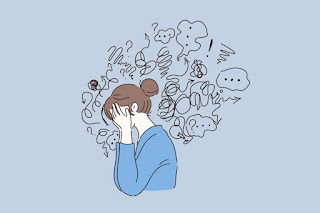Mental Illness vs Mental Disorder
The terms "mental problem" and "mental illness" are generally used interchangeably. But traditionally, there has been a differentiation between mental disease and mental disorders.
Grab a cup of soda. Let's walk through the difference between MI and MD.
What is Mental Disorder?
The American Heritage Stedman's Medical Dictionary: defines the term "disorder" in medicine
Disorder (ds-or'dr) is a noun. A disturbance or derangement that interferes with the mind's or body's ability to function, such as an eating disorder or drug usage.
It better suits what we now refer to as mental illnesses because the meaning of "disorder" includes, specifically.
A disturbance of the mind (such as a mental disorder), especially before we realized mental disorders are actually disorders of the brain (and not simply the "mind").
What is Mental Illness?
The term "sickness" in medicine is defined as follows by The American Heritage Stedman's Medical Dictionary:
illness disease (d-z-z') n. a diseased state of an organ, bodily component, or system brought on by several factors, such as an infection, a genetic flaw, or environmental stress, and characterized by a recognizable set of signs or symptoms.
Before they realized that mental illnesses are diseases of the body, people were less inclined to use the phrase "mental illness" because "disease" requires that the pathological condition is of a physical part.
Therefore, the distinction between "mental disorder" and "mental illness" can be made by taking the cause of the ailment into account.
The Distinction Between Mental Illness and Mental Disorder?
The medical definition of an illness is a disease of the body or mind that can cause poor health according to the medical definition of an ailment.
While a disease is, according to medical terminology. Is an abnormal state of a portion, organ, or system of an organism.
An infection, an inflammatory reaction, the environment, or a genetic flaw may bring these aberrant situations on. We can consider the presence of any of these as a disease.
The root cause of the ailment is the major distinction between a mental disorder and a mental illness.
However, you'll hear experts using phrases like "mental disease," "mental condition," and "mental health" interchangeably.
Prior to the development of a greater understanding of mental health, professionals thought the term "disorder" was more appropriate than "disease".
The term "mental illness" started to be used more frequently once psychologists and scientists discovered that mental illnesses are bodily diseases.
RECOMMENDED
- Mental Health Awareness
- Food Addiction
- Apple Fitness Plus
- Borderline Personality Disorder (BPD)
- Nomadic Lifestyle
Frequently Asked Questions
Anxiety disorders, eating disorders (for example anorexia or bulimia), mood disorders (for example depression or bipolar).
Besides, personality disorders (for example borderline personality disorder) and psychotic disorders (for example schizophrenia) are all forms of mental illnesses.
2. Who is Susceptible to Getting a Mental Illness?
A wide range of conditions can jeopardize the mental health of an individual. Family, community and structural elements can work together to support or jeopardize mental health at any one time.
Even while most people are resilient, those who are exposed to unfavorable conditions, such as poverty, violence, handicap, and inequality, are more at risk.
3. How Can Mental Illness be Treated?
Seeking expert medical care is the first step in addressing any mental disorder. An expert in mental health will identify your symptoms.
Additionally, they will advise you on how to effectively cure and manage the problems.
4. Is Substance Abuse a Form of Mental Illness?
It is called an abuse for a reason, when a substance is being abused beyond a consumer's capacity to control its intake. It becomes a mental illness.
5. Is Sexual Aversion Disorder?
Yes, sexual aversion is a mental disorder because it obstructs how an individual ought to behave.
Therefore, the distinction between "mental disorder" and "mental illness" can be made by taking the origin of the ailment into account.







